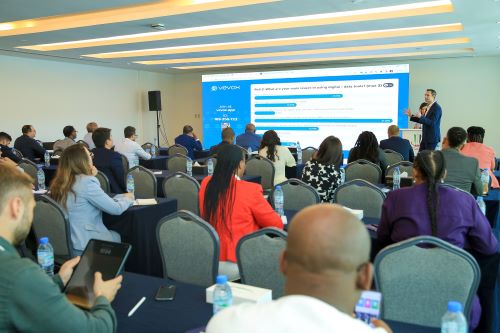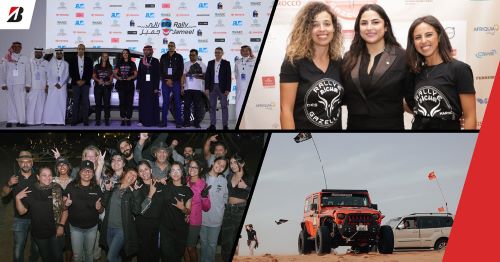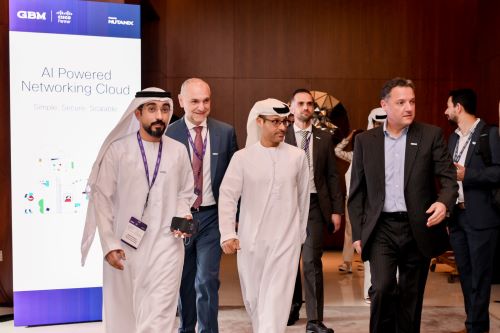Annual Investment Meeting 2023 hosts value-adding pre-conference workshops for participants

With the goal of adding value and experience about investment opportunities for its regional and global participants, the 12th edition of the Annual Investment Meeting held a series of pre-event workshops and professional training sessions today, May 7, a day prior to the official start of the conference.
These workshops were split into four categories – FDI, Future Cities, SME, and Startup – and all aimed to serve as an opportunity for governments, startups, small and medium-sized enterprises as well as investors to touch base and achieve economic growth for their respective countries.
Under the FDI category, the workshops organized included Global Data’s “Creating Opportunities for FDI Attraction Using Data and Innovative Digital Tools,” whose topics covered the FDI strategy post-COVID and building a roadmap, key trends that will drive innovative FDI and IPA strategies, and how to use digital tools to improve reach and engage new markets; World Association of Investment Promotion Agencies’ “New Age IPAs: Aligning with the Changing World Order,” which tackled in its four sessions global FDI trends and outlook, good practices followed by best-in-class IPAs through the investment lifecycle including a sharing of experience from an LDC IPA leader, and the five key strategies essential for New Age IPAs; NxtZones’ “The Future of Investment Promotion,” which addressed the way IPAs can change their activities and organizational structure in order to continue to successfully attract and maintain FDI; GDP Global’s “Attracting High-Quality FDI for Economic Growth,” whose topics included innovation and best practice in economic and investor research, IP strategy, campaign planning, country and sector targeting, engagement with investors, and key milestones in attracting investment; and FDI Center’s “How to Provide What Investors Want,” a very practical session that offered detailed insight into how corporate investors make international expansion and location decisions.
The Future Cities category featured EXPO City Dubai’s “Value Creation in Cities & Communities,” which provided insights, experiences, and expertise to city and community stakeholders to support them in adopting a values-driven, holistic approach to address the unique challenges that they face; and WeGo’s “The Making of Smart and Sustainable City: Implementing smart and sustainable city projects through Private-Public-People Partnership (PPPP),” in which policy makers, officials from local and central governments and other interested stakeholders in the smart city field engaged in an interactive and open discussion around the actual challenges faced when developing smart and sustainable cities.
Meanwhile, ITC – She Trades’ “Power Up Your Business,” which was an SME workshop, discussed the key barriers and bottlenecks for women in trade, with a special focus on the UAE, among other key topics. The other two SME workshops were INSME’s “Bringing Innovation to the Market,” which introduced SMEs to strategies and tools on how to gain customer insights, develop new products that match customers’ needs and solutions with solid value propositions, and create a go-to-market strategy; and Union of Arab Banks’ “Enhancing SME Access to Finance: Financial Inclusion Perspective,” which discussed mechanisms and initiatives to improve SME access to financial services and attract new segments of companies to the banking sector.
Lastly, the Startup workshop sessions comprised Tick & Talk’s “Crafting a Winning Investor Pitch: 12 Essential Components to Impress Investor,” which covered how to craft a winning and captivating investment pitch deck; World Business Angels Investment Forum’s “What do angel investors learn before they invest in startups?,” which discussed the dos and don’ts while raising funds as a qualified entrepreneur and a startup founder; Hub71’s “A Startup’s Guide to Corporate Partnerships: Master the art of pitching and discover techniques to create a winning proposition that unlocks growth opportunities,” which provided startups with a deeper understanding on how to structure their pitches specifically for corporations; and Founders Institute’s “7 C’s of Startup Strategy,” which guided entrepreneurs to the underlying factors contributing to setting a strategy that is solid, subjective, and versatile.
Last Updated on 2 years by News Desk 2












